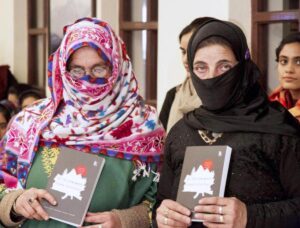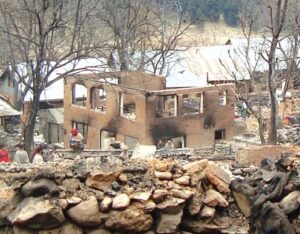
Kunan Poahpora: The Night That Refuses to Leave
Muhammad Shahbaaz
Kashmir remains a bleeding wound, and within its folds lies the overlooked anguish of its women. How does one reconcile with a reality where every street corner is haunted by uniformed men whose very presence reeks of impunity? The women of this occupied region have been facing these foreign military men since decades now. They are reminded, day after day, that the gun in the soldier’s hand is a license to demean, to threaten and to silence anyone from the local population. In this asymmetry of power, Kashmiri women continue to be specific targets of a state policy that weaponizes their vulnerability.
What does it mean to exist as a woman under a vindictive illegal militarization? The answer begins with a harsh reality: to be born into such an environment is to inherit a legacy of trauma. From the moment a girl opens her eyes to the barbed wires and bunkers of Kashmir, she learns that her body is viewed as a battlefield. The first lesson she absorbs is how to navigate her existence under a militarized gaze, where even a glance could be misinterpreted, and any movement could be misjudged. Her childhood is spent in the shadow of relentless vigilance. Her adolescence is marked by the stories of Kunan Poshpora—not as a distant nightmare but as a present and persistent threat.
Kunan and Poshpora. The names alone echo with the cries of more than sixty women, aged thirteen to sixty, who bore the brunt of Indian military brutality in 1991. The twin villages, became synonymous with mass rape as a weapon of war. The state dismissed the survivors’ testimonies as propaganda. Yet, what propaganda could fabricate such harrowing uniformity in the pain of women who barely knew one another? This was not an isolated incident but an organized assault on a community’s dignity and a deliberate message to all Kashmiri women that their bodies could be violated with impunity. And who will argue otherwise when, to this day, not a single perpetrator has been held accountable?
This systemic violence is indeed intrinsic to the occupation’s machinery. Rape is not just an act of brutality but a strategic tool to fracture the spirit of resistance. It humiliates, it dehumanizes, and it sends a chilling message that if you dare to resist, we will violate the sanctity of your women. For the mothers, sisters, and daughters of Kashmir, every knock on the door after dusk carries this dread even now. Justice, to this day, remains a distant dream and a mirage that vanishes under the state’s deliberate obfuscation. What can justice mean in a land where power dynamics mock the very notion of accountability?
But the story of Kashmiri women is not solely one of victimhood. To reduce it to that would be an injustice of another kind. These women have stood tall in defiance of oppression and challenged the occupier’s narrative and asserted their place in the freedom struggle. They have led protests, shielded armed fighters, and provided moral and logistical support to the movement for self-determination. Under the banners of Dukhtaran-e-Millat, Muslim Khawateen Markaz, and others, they have voiced their demands with unparalleled courage. Asiya Andrabi, Yasmeen Raja, Farida Behanji and Nahida Nasreen are indeed the symbols of resistance—imprisoned, silenced, and demonized, yet unyielding. Their legacy is a testament to the indomitable spirit of Kashmiri women, who refuse to bow before the might of an occupying force.
There is no denying that every act of resistance exacts a cost. For Kashmiri women, this cost is often paid in silence and sacrifice. They bury their husbands, brothers, and sons, knowing full well that justice is an illusion under occupation. They carry the pain of enforced disappearances, often spending years—even lifetimes—searching for a trace of their loved ones. They endure the indignity of being labeled as victims of “crossfire” or “collateral damage,” terms that sanitize the violence inflicted upon them but their resolve remains unbroken. Even in mourning, they whisper stories of courage and hope to the next generation.
Kashmiri women face another kind of assault — the objectification by Indian society. Indian politicians, especially after 2019, make grotesque comments about marrying fair-skinned Kashmiri women thereby turning their suffering into a vile fantasy. State-sponsored programs encourage the elopement of Kashmiri girls with Hindu men. Even tourists and influencers visiting the region treat Kashmiri women as exotic spectacles, speaking on camera with a casual vulgarity and get away with it. For a Kashmiri woman, this is a continuation of the occupation by other means. It strips her of dignity, reduces her to a caricature, and denies her the right to exist as an individual. What does this relentless objectification mean for a Kashmiri woman? It is a layered violation, compounding the trauma of militarization with the indignity of being fetishized. It reinforces her alienation and makes her a stranger in her homeland and a target of ridicule or conquest. This is a deliberate tactic by Indians to undermine her sense of self and her place in the resistance. The psychological toll is immense, but so is the resilience required to endure and resist such multi-faceted oppression.
The world, however, remains deaf to these whispers. International bodies and human rights organizations issue periodic reports, but where are the actionable outcomes? How many more Kunan Poshporas will it take for the global conscience to wake up? The silence of the international community is complicity, plain and simple. It emboldens the perpetrators and leaves Kashmiri women to fend for themselves in a world that pretends to champion women’s rights.
Kashmiri women do not need pity; they need solidarity. The use of rape as a weapon of war must be unequivocally condemned and criminalized on a global scale. Legal frameworks and international mechanisms must be strengthened to address these war crimes.
Kashmir’s occupation is a humanitarian crisis that disproportionately affects women. The pain, the resilience, and the courage of Kashmiri women must be amplified, not sidelined. Their voices are not mere echoes of despair. They are clarion calls for justice and freedom. And as long as they continue to resist, the dream of Azadi lives on, unbroken and undeterred.



